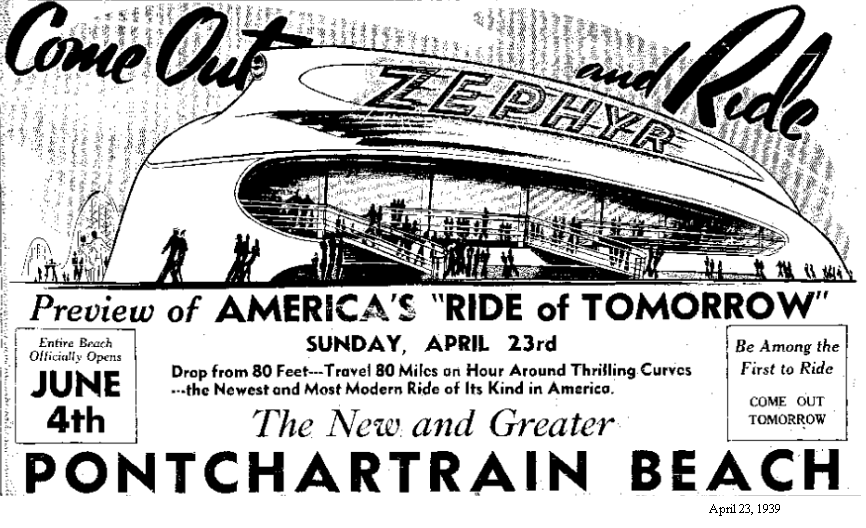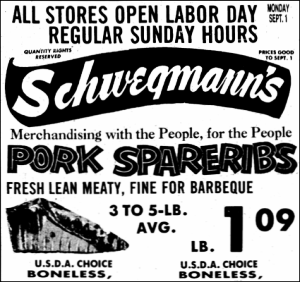|
Today in New Orleans History |
|
|
April 1


 WRNO
was also home to a popular shortwave radio service in the 1980s and 1990s called WRNO Worldwide,
now owned by a Christian broadcaster. On November 13, 2006, at 4:00 AM, after signing off with The Doors'
"The End," WRNO flipped to an interactive Talk radio format as "The New 99.5FM.com." As explained in
the official mission statement posted at its website, "The station is committed to providing listeners with everything
they need to know on the radio at 99.5 FM and on demand at thenew995fm.com." On the same day Sister station KHEV
would pick up "the Rock of New Orleans" slogan and use it as their new slogan for their flip from gospel to Active Rock. On April 1, 2008, the station switched to "Rush
Radio," all day repeats of The Rush Limbaugh Show and a tape loop of Rush's theme song, the instrumental from
My City Was Gone by The Pretenders, during times when the show was not playing. The stunt was to celebrate the acquisition
of the show from longtime affiliate WWL. The station resumed its regular schedule on April 7. The
Limbaugh program had previously aired on WRNO Worldwide, which Limbaugh called "The EIB World Service" on the air
(in joking reference to the BBC World Service). The stations are no longer co-owned. Notable station
alumni include Bill Burkett, E.Alvin Davis, Joe Clark, Bobby Reno (now on WTIX FM owned by Michael Costello, Joe's brother),
Captain Humble, Doug Christian, and Russ Boney. WRNO alumni also include former PD Michael Costello
"Michael In The Morning"/"M&M" (brother of late WRNO founder/owner Joseph Mark Costello III); Jim
White; DJ-turned-actor John Larroquette ; Soxless Scott Seagraves; Jeff "JD The DJ" Douglas, famous for his
"Rock 'n' Roll Flight To Midnight"; Tom Owens; Jimbo Roberts :Johnny Tyler; "Weerd" Wayne Watkins;
Mary London; Lyn Taylor (Now a Program Manager at CBS Radio Detroit); and writer-producer Vance DeGeneres. (Douglas and Costello
are currently jocks at WTIX-FM, which Costello is owner.) Steve Suter (Now on Magic 101.9) did the Morning show with sidekick
Kevin Carlile. They became the "Morning Dudes" are were hired away to Baton Rouge after 2 years.' (From http://en.wikipedia.org/wiki/WRNO-FM)  

To receive an update for each day in New Orleans
history, join our facebook page
- Today in New Orleans History
Wayne Mack (May 22, 1924 – April 1, 1993) was host of 1960s WDSU-TV, Channel 6,
New Orleans, Louisiana children's show that showed the “Three Stooges” shorts. His on screen persona was the "Great
McNutt” and he dressed in movie director's garb, along with a large megaphone. His big line was “Lights, camera,
action, start the cotton pickin’ show!” just prior to the start of the short subject. In the Three Stooges movie
“The Outlaws is Coming” he played Jesse James. As in most early day television stations he played several on
screen parts, including co host of the “Midday" show, an electronic magazine program, as well as sportscasting
in the local evening news. Mack also called radio play-by-play of the New Orleans Saints from 1975 to 1981. A flavor for
Mack's broadcast style is provided by WDSU-TV. Mack, together with fellow New Orleans sportscasters Hap Glaudi and Buddy Diliberto,
provided the New Orleans television market with a unique and distinctive repertoire of sports broadcasters. The three New
Orleans sportscasters were discussed together by New Orleans journalist Bill Baumgarner. (WIKI)
|
|
|

To receive an update for each day in New Orleans history,
join our facebook page - Today in New
Orleans History.
Analytics |
 WRNO radio first hit the airwaves on the air October 17, 1967. Although its previous slogan was "We're
the Rock of New Orleans," the station's call letters stand for "Westbank Radio New Orleans." The station
operated a popular business selling rock t-shirts, records and other music related items called the WRNO "Rock Shop"
on the ground level of the studio. Since its inception in 1967, WRNO endured many incarnations with different rock music
formats, finally adopting the Classic rock format in 1997. On the right is a 1974 print advertisement.
WRNO radio first hit the airwaves on the air October 17, 1967. Although its previous slogan was "We're
the Rock of New Orleans," the station's call letters stand for "Westbank Radio New Orleans." The station
operated a popular business selling rock t-shirts, records and other music related items called the WRNO "Rock Shop"
on the ground level of the studio. Since its inception in 1967, WRNO endured many incarnations with different rock music
formats, finally adopting the Classic rock format in 1997. On the right is a 1974 print advertisement.  Notable programming includes Jim Bohannon's America in the Morning, Denny Schaffer on The Denny Schaffer Show,
Glenn Beck Program, The Rush Limbaugh Show, The Sean Hannity Show, John Osterlind, Mark Levin, and George Noory. Osterlind
was known as "Ozone" during stints at WAAF Worcester MA and WRKO Boston MA.
Notable programming includes Jim Bohannon's America in the Morning, Denny Schaffer on The Denny Schaffer Show,
Glenn Beck Program, The Rush Limbaugh Show, The Sean Hannity Show, John Osterlind, Mark Levin, and George Noory. Osterlind
was known as "Ozone" during stints at WAAF Worcester MA and WRKO Boston MA.
